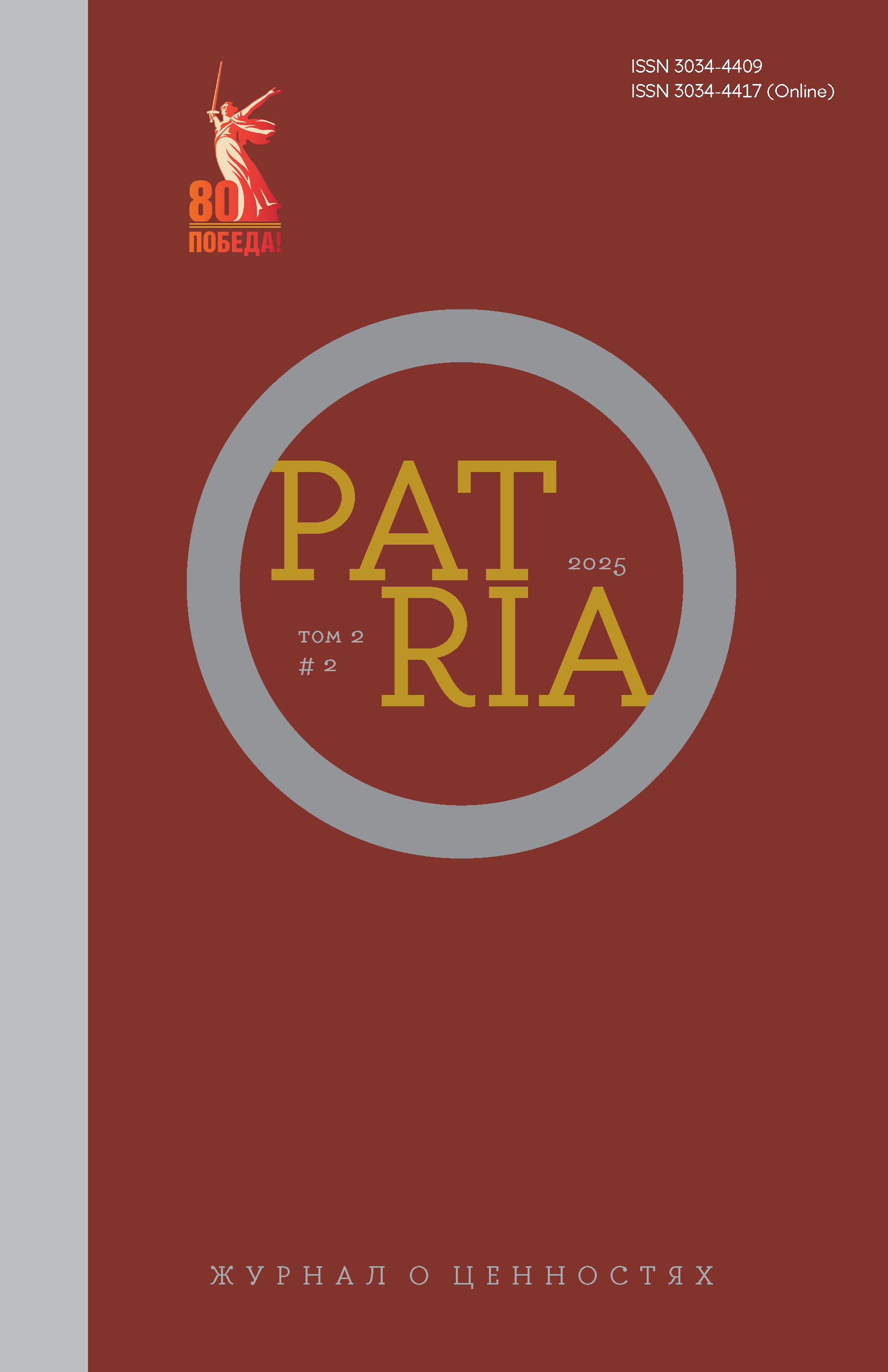The Value of the Great Victory: Emotional Optics
Abstract
The article is devoted to the study of the role of emotions in the formation of historical memory and axiological guidelines related to Victory in the Great Patriotic War in the post-truth era. The authors analyze how emotional narratives become a tool for constructing collective identity and resist the revision of historical facts. In the context of the crisis of global projects of the future, the past, and especially the historical events of 1941–1945, are turning into a key element of self-determination that unites Russian society through the sacralization of heroism and sacrifice. The main focus is on the conflict between official and alternative interpretations of history, manifested in the ‘‘memorial wars’’. Examples include disputes about the role of the USSR in defeating Nazism, attempts to equalize the USSR and the Third Reich, as well as resolutions of European parliamentary institutions reviewing the causes of World War II. The authors emphasize that these conflicts do not reflect a clash of facts, but a struggle of values rooted in emotions — pride, sorrow. Through the prism of emotional axiology and epistemology, the article reveals the role of rituals (parades, the Immortal Regiment), media and art in maintaining an affective connection with the past. These practices, reinforced by digital technologies, form an ‘‘emotional credibility’’ where experience prevails over rational assessment. The philosophical basis of the work is based on the ideas of M. Scheler, P. Nora and G. Deleuze, demonstrating how emotions construct value realities and become mediators between the past and the present. In the context of post-truth, Victory is interpreted as a ‘‘living memory’’ that resists the erosion of historical truth. The authors argue that emotional optics allows us to overcome the binary of rational and sensual, revealing the dynamics of memory as a hybrid process where official narratives, personal stories and collective myths interact. Thus, the Great Victory remains not only a historical event, but also an ethical landmark that unites society in an era of information instability.
Downloads
References
Ahmed S. (2014) The Cultural Politics of Emotion, 2nd ed., Edinburgh: Edinburgh University Press.
Aronson O. V. (2015) “Affect in the Coordinates of Non-Philosophy”, Filosofskii Zhurnal, vol. 8, no. 1, pp. 33–46.
Bareither C. (2021) “Capture the Feeling: Memory Practices in Between the Emotional Affordances of Heritage Sites and Digital Media”, Memory Studies, vol. 14, no. 3, pp. 578–591.
Boler M., Davis E. (2018) “The Affective Politics of the ‘Post-Truth’ Era: Feeling Rules and Networked Subjectivity”, Emotion, Space and Society, vol. 27, pp. 75–85.
Deleuze G. (2003) Deux régimes de fous et autres textes. 1975–1995, P.: Editions de Minuit.
Deleuze G., Guattari F. (2010) A Thousand Plateaus: Capitalism and Schizophrenia, Yekaterinburg: U-Factoria; Moscow: Astrel.
Deonna J., Teroni F. (2025) “Why Are Emotions Epistemically Indispensable?”, Inquiry: An Interdisciplinary Journal of Philosophy, vol. 68, no. 1, pp. 91–113.
Derrida J. (2006) Specters of Marx: The State of the Debt, the Work of Mourning and the New International, Moscow: Logos-altera: Ecce homo.
Engelsen S. (2011) “Emotional Awareness in Scheler’s Axiology and the Queerness Argument”, Appraisal, vol. 8, no. 3, pp. 1–9.
Foucault M. (2004) The Archaeology of Knowledge, Saint Petersburg: Gumanitarnaya Akademiya: Universitetskaya kniga.
Halbwachs M. (2005) “Collective and Historical Memory”, Neprikosnovennyi Zapas, no. 2–3 (https://magazines.gorky.media/nz/2005/2/kollektivnaya-i-istoricheskaya-pamyat.html, accessed on 27.03.2025).
Halbwachs M. (2007) The Social Frameworks of Memory, Moscow: Novoe izdatelstvo.
Kensinger E. A. (2009) “Remembering the Details: Effects of Emotion”, Emotion Review, vol. 1, no. 2, pp. 99–113.
Latour B. (2025) Politics of Nature: How to Bring the Sciences into Democracy, Moscow: Ad Marginem.
Mitchell J. (2017) “The Epistemology of Emotional Experience”, Dialectica, vol. 71, no. 1, pp. 57–84.
Muis K. R., Chevrier M., Denton C. A., Losenno K. M. (2021) “Epistemic Emotions and Epistemic Cognition Predict Critical Thinking about Socio-Scientific Issues”, Frontiers in Education, vol. 6, art. 669908.
Nora P. (1999) “The Problematic of Places of Memory”, in France-Memory, Saint Petersburg: Izdatelstvo Sankt-Peterburgskogo universiteta.
Nussbaum M. C. (2001) Upheavals of Thought: The Intelligence of Emotions, Cambridge: Cambridge University Press.
Scheler M. (1994) “Formalism in Ethics and Non-Formal Ethics of Values”, Scheler M. Selected Works, Moscow: Gnosis.
Schmidt K., Patnaik P., Kensinger E. A. (2011) “Emotion’s Influence on Memory for Spatial and Temporal Context”, Cognition & Emotion, vol. 25, no. 2, pp. 229–243.
Velázquez J. (2023) “Feeling in Values: Axiological and Emotional Intentionality as Living Structure of Ethical Life, Regarding Max Scheler’s Phenomenology”, Human Studies, vol. 46, pp. 43–57.
Vilhunen E. et al. (2022) “Clarifying the Relation Between Epistemic Emotions and Learning by Using Experience Sampling Method and Pre-Posttest Design”, Frontiers in Education, vol. 7, art. 826852.
Yakovleva I., Kosenko T. (2021) “Facets of Emotional Life of People: Axiological Content of the Concept”, Paideia: philosophical e-journal of Charles University, vol. 18, no. 1, pp. 1–7.
Yang Y. et al. (2023) “Do Emotions Conquer Facts? A CCME Model for the Impact of Emotional Information on Implicit Attitudes in the Post-Truth Era”, Humanities and Social Sciences Communications, vol. 10, art. 415.
Youpa A. (2019) The Ethics of Joy: Spinoza on the Empowered Life, N. Y.: Oxford University Press.
Copyright (c) 2025 HSE University

This work is licensed under a Creative Commons Attribution 4.0 International License.



